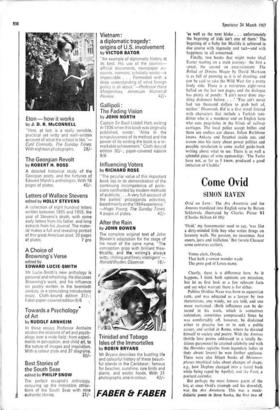Come Ovid
SIMON RAVEN
'Ovid,' my housemaster used to say, 'was like a dirty-minded little boy who writes things on lavatory walls. No passion, no reverence. Just sneers, jeers and titillation.' But (wrote Chaucer some centuries earlier),
Venus clerk, Ovyde, That hath y-sowen wonder wyde The grete god of Loves name.
Clearly, there is a difference here. As it happens, I think both opinions are mistaken; but let us first look at a few relevant facts and see what warrant there is for either.
Publius Ovidius Naso was born to equestrian rank, and was educated as a lawyer by two rhetoricians, one windy, we are told, and one more restrained. (Both influences can be de- tected in his work, which is sometimes redundant, sometimes compressed.) Since he was comfortably off, however, he disdained either to practise law or to seek a public career, and settled in Rome, where he devoted himself to society and poetry. With the Amores (brittle love poems addressed to a totally fic- titious paramour) he attained celebrity and with the Heroides (epistles from legendary ladies to their absent lovers) he won further applause. There were also fifteen books of Metamor- phoses (mythical tales about changes of shape; e.g., how Daphne changed into a laurel bush while being raped by Apollo), and the Fasti, a poetical calendar.
But perhaps the most famous poem of the lot, at once Ovid's triumph and his downfall, was the Ars Amatoria. This was a mock- didactic poem in three books, the first two of which instruct us how to select, seduce and keep a mistress, while the third offers corre-
sponding advice to women. Unfortunately the publication of this piece coincided with one of Augustus's periodical fits of morality; the Em- peror had just banished his own daughter for
promiscuity, and now, partly because of the depraved matter of the Ars and partly because of some scandal which has never been disclosed, he sent Ovid packing to the shores of the Black Sea. Here the unhappy poet languished until his death, writing his Tristia, a title which speaks for itself.
So far, then, the betting seems in favour of my housemaster's view. Obviously, Ovid was a 'bad influence' and had been expelled, so to speak, for corrupting the tone of the house. Chaucer's solemn apostrophe would seem, to say the least of it, misplaced. But if we turn to a closer examination of the poem which caused all the fuss, we shall find that the issue is not quite so simple.
The Ars Atnatoria is not at all what it is often cracked up to be. Both its admirers
and its detractors claim that it is a cynical, witty and even perceptive treatise, written in tight and polished verse, on how to get your girl. But since Ovid, as he makes plain, is dis- coursing only of demi-mondaines, the contest is spurious and the conclusion foregone: the sole piece of advice needed is, 'put money in
thy purse.' In so far as the Ars is not just a variation on this single theme, it consists either
of stale tips known to any schoolboy since the
flood (e.g., drop your programme so that you can look up her skirt) or of rather insulting
reminders about guarding against BO. Although the poise of the verse is undeniable, it cannot begin to make up for the tedium and triviality of its content; and as for pornographic value, the poem is about as lascivious as Donald Duck. I simply cannot conceive, in short, what either Augustus or my housemaster thought they were complaining about; quite the con- trary, they should have been delighted that immorality could be made to appear so thoroughly boring.
But if it is difficult to discern just why they were so disgusted, it is even harder to discern
why Chaucer was so misled. Such appeal as Ovid has, in the Ars or elsewhere, depends not on his celebration of 'the grete god of Loves name' but on his powers as an anecdotist. He could tell delicious and decorative little stories: in a word, he was a very pretty gossip. If this was what Chaucer enjoyed, well and good; but why his enthusiasm for the love poetry? Why the Romans', come to that?
I offer no explanation, I merely observe that Ovid seems to me to have been both blamed and praised beyond possible deserts. This being so, Mr Saklatvala's translation does us a
valuable office, for it is very faithful to mean- ing and brings out just how commonplace the poet mostly was. The pictures in this edition do a similar service: the girls look like cheap models and the boys like hairdressers' assis- tants, and of such was the stuff of Ovid.



































 Previous page
Previous page